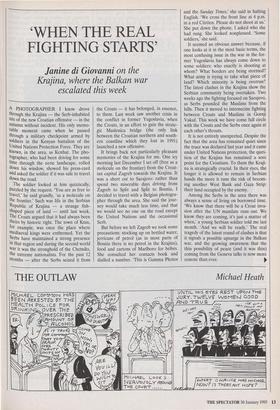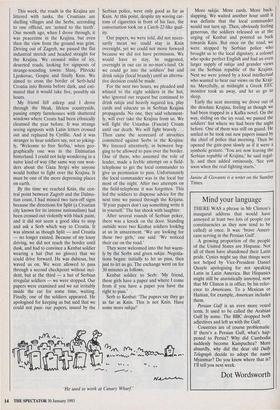`WHEN THE REAL FIGHTING STARTS'
Janine di Giovanni on the
Krajina, where the Balkan war escalated this week
A PHOTOGRAPHER I know drove through the Krajina — the Serb-inhabited site of the new Croatian offensive — in the autumn without incident. His only memo- rable moment came when he passed through a military checkpoint armed by soldiers in the Kenyan battalion of the United Nations Protection Force. They are known, in the area, as Kenbat. The pho- tographer, who had been driving for some time through the eerie landscape, rolled down his window, showed his press-card and asked the soldier if it was safe to travel down the road.
The soldier looked at him quizzically, Puzzled by the request. 'You are as free to travel,' he said grandly, 'as a molecule on the frontier.' Such was life in the Serbian Republic of Krajina — a strange fish- shaped piece of land — until last week. The Croats argued that it had always been theirs by historic right. The town of Knin, for example, was once the place where mediaeval kings were enthroned. Yet the Serbs have maintained a strong presence In that region and during the second world war it was the stronghold of the Chetniks, the extreme nationalists. For the past 12 months — after the Serbs seized it from the Croats — it has belonged, in essence, to them. Last week saw another crisis in the conflict in former Yugoslavia, when the Croats, in an effort to gain the strate- gic Maslenica bridge (the only link between the Croatian northern and south- ern coastline which they lost in 1991) launched a new offensive.
It brings back not particularly pleasant memories of the Krajina for me. One icy morning last December I set off (free as a molecule on the frontier) from the Croat- ian capital Zagreb towards the Krajina. It was a short cut to Sarajevo: rather than spend two miserable days driving from Zagreb to Split and Split to Bosnia, I decided to travel with a Belgian photogra- pher through the area. She said the jour- ney would take much less time, and that we would see no one on the road except the United Nations and the occasional Serb.
But before we left Zagreb we took some precautions: stocking up on bottled water, jerricans of petrol (as in most parts of Bosnia there is no petrol in the Krajina), food and cartons of Marlboro for bribes. She consulted her contacts book and dialled a number. 'This is Gamma Photos and the Sunday Times,' she said in halting English. 'We cross the front line at 4 p.m. in a red Citroen. Please do not shoot at us.' She put down the phone. I asked who she had rung. She looked nonplussed. 'Some soldiers,' she said.
It seemed an obvious answer because, if one looks at it in the most basic terms, the most confusing issue in the war in the for- mer Yugoslavia has always come down to some soldiers: who exactly is shooting at whom? What borders are being stormed? What army is trying to take what piece of land? Which minority is being overrun? The latest clashes in the Krajina show the Serbian community being overtaken. Two weeks ago the fighting focused on Sarajevo, as Serbs pounded the Muslims from the hills. Then it moved to internecine fighting between Croats and Muslims in Gornji Vakuf. This week we have come full circle with the Croats and the Serbs once again at each other's throats.
It is not entirely unexpected. Despite the fact that the area has remained quiet since the truce was declared last year and it came under United Nations protection, the ques- tion of the Krajina has remained a sore point for the Croatians. To them the Kraji- na is strategically crucial. In their eyes, the longer it is allowed to remain in Serbian hands the more it runs the risk of becom- ing another West Bank and Gaza Strip: their land occupied by the enemy.
Among the Serbs in the area there was always a sense of living on borrowed time. `We know that there will be a Croat inva- sion after the UN mandate runs out. We know they are coming, it's just a matter of when,' a young Serbian soldier told me last month. 'And we will be ready.' The real tragedy of the latest round of clashes is that it signals a possible upsurge in the Balkan war, and the growing awareness that the thin possibility of peace (and it was thin) coming from the Geneva talks is now more remote than ever. This week, the roads in the Krajina are littered with tanks, the Croatians are shelling villages and the Serbs, according to one official, are 'armed to the teeth'. One month ago, when I drove through, it was peacetime in the Krajina, but even then the view from the ground was grim. Driving out of Zagreb, we passed the flat industrial stretch and headed straight for the Krajina. We crossed miles of icy, deserted roads, looking for signposts of strange-sounding towns: Slunj, Plitvicki Ljeskovac, Gospic and finally Knin. We aimed to cross the border of Serb-held Croatia into Bosnia before dark, and esti- mated that it would take five, possibly six hours.
My friend fell asleep and I drove through the bleak, lifeless countryside, passing empty farmhouses with shattered windows where Croats had been ethnically cleansed the year before. It was strange seeing signposts with Latin letters crossed out and replaced by Cyrillic. And it was stranger to hear soldiers say, not so joking- ly, 'Welcome to free Serbia,' when geo- graphically one was in the Dalmatian hinterland. I could not help wondering in a naïve kind of way (the same way one won- ders about the Gaza Strip) why anyone would bother to fight over the Krajina. It must be one of the more depressing places on earth.
By the time we reached Knin, the cen- tral point between Zagreb and the Dalma- tian coast, I had missed two turn-off signs because the directions for Split (a Croatian city known for its intense nationalism) had been crossed out violently with black paint, and it did not seem a good idea to stop and ask a Serb which way to Croatia. It was almost as though Split — and Croatia — no longer existed. Because of my lousy driving, we did not reach the border until dusk, and had to convince a Kenbat soldier wearing a hat (but no gloves) that we could drive forward. He was dubious, but waved us on. We were allowed to pass through a second checkpoint without inci- dent, but at the third — a but of Serbian irregular soldiers — we were stopped. Our papers were examined and we sat irritably inside the car for some time, waiting. Finally, one of the soldiers appeared. He apologised for keeping us but said that we could not pass: our papers, issued by the Serbian police, were only good as far as Knin. At this point, despite my waving car- tons of cigarettes in front of his face, the conversation took on a Catch-22-like qual- ity.
Our papers, we were told, did not neces- sarily mean we could stay in Knin overnight, yet we could not move forward because we did not have permission. We would have to stay, he suggested, overnight in our car in no-man's-land. Or we could go into the soldiers' but and drink rakija (local brandy) until an alterna- tive decision could be made.
For the next two hours, we pleaded and whined to the eight soldiers in the hut, who ignored our request but continued to drink rakija and heavily sugared tea, play cards and educate us in Serbian Krajina propaganda. No one, they said vehement- ly, will ever take the Krajina from us. We will fight the Ustashas (Fascist) Croats until our death. We will fight bravely ... Then came the scorecard of atrocities committed against Serbs in the Krajina: We listened attentively, in between beg- ging to be allowed to pass over the border. One of them, who assumed the role of leader, made a feeble attempt on a field- telephone to get the local commander to give us permission to pass. Unfortunately the local commander was in the local bar most of the night. After two attempts on the field-telephone it was forgotten. This led the soldiers to dispense advice for the next time we passed through the Krijana. `If your papers don't say something write it in yourself.' The but shook with laughter.
After several rounds of Serbian poker, there was a knock on the door. Standing outside were two Kenbat soldiers looking at us in amazement. 'We are looking for these two girls,' one said. 'We noticed their car on the road.'
They were welcomed into the but warm- ly by the Serbs and given rakija. Negotia- tions began: initially to let us pass, then just to let us go. The exchange went on for 30 minutes as follows.
Kenbat soldier to Serb: 'My friend, these girls have a paper and where I come from if you have a paper you have the right to pass.'
Serb to Kenbat: 'The papers say they go as far as Knin. This is not Knin. Have some more rakijar' `He used to work at Canary Wharf.' More rakija. More cards. More back- slapping. We waited another hour until it was definite that the local commander would not turn up. Then, obviously feeling generous, the soldiers released us at the urging of Kenbat and pointed us back towards Knin. But once on the road, we were stopped by Serbian police who brought us to the local dignitary, a colonel who spoke perfect English and had an even larger supply of rakija and grander views on the Serbian republic of the Krajina. Next we were joined by a local intellectual who wanted to hear our views on the Kraji- na. Mercifully, at midnight a Greek EEC monitor took us away, and let us go to sleep.
Early the next morning we drove out of the desolate Krajina, feeling as though we had been trapped in a Kafka novel. On the way, sliding on the icy road, we passed the soldiers' but where we had been the night before. One of them was still on guard. He smiled as he took out new papers issued by the chief of police that morning. Then he opened the gate-post slowly as if it were a symbolic gesture. 'You are now leaving the Serbian republic of Krajina,' he said regal- ly, and then added ominously, 'See you soon when the real fighting starts.'
Janine di Giovanni is a writer on the Sunday Times.











































































 Previous page
Previous page